- Home
- Sam Siciliano
The White Worm Page 10
The White Worm Read online
Page 10
“Thank you for your consideration, Dr. Vernier, but I have partaken of the sun’s rays in this way before. No great harm came of it. Please do sit down.”
I walked over to Holmes and jerked an iron chair outward toward the ocean.
“Oh, I want to go in.” Miss Marsh sounded near tears.
“Don’t be ridiculous, Diana. We are all settled at last. Anyway, Mr. Holmes, so you are going to stay with us for a while? You say Mr. Selton’s parents have arrived. Still, Lesser Hill is large enough; I would have thought it could accommodate you all.” Her voice was faintly ironic.
“I must admit, Lady Verr, that his father, Mr. Richard Selton, does not seem to care much for consulting detectives.”
“Well, his loss is our gain.”
“Do you think you will take tea inside this afternoon, madam, or out here on the terrace?”
“The terrace, of course, Mr. Holmes. Such fine weather must not be wasted.”
I drummed my fingers on the cold metal arm of the chair and stared at the sea. Holmes had his back to them, while my chair was actually facing them, although turned outward. He might find this vaguely amusing, but I hadn’t the patience for it—nor for Lady Verr. Something clacked, clacked again, a short burst of sound. I frowned slightly. The sound repeated itself. I turned. Diana’s desperate eyes briefly caught mine, those slivers of green around pupils swollen huge and black in the sun. I realized immediately what it was. She made the same involuntary sound; her teeth were chattering.
“All right—enough is enough.” I stood up, took off my coat, and walked round toward Miss Marsh, trying not to exactly look at her. “You are freezing—put this on.” She turned, and I slipped my coat over her shoulders. She immediately stood and seized the lapels, pulled it awkwardly round her, then her long slender white arm came out and drew it closer, wrapping it more tightly, hiding her torso. I could see the gooseflesh sprouted on the rounded curve of her shoulder. She gave me a look of such gratitude that I knew I had made a friend forever. “Oh, thank you.” Her eyes were full of tears.
Again I shook my head. “Come on, let’s go inside.” She quickly stood up.
“Dr. Vernier, you must not yield to her every whim.”
“Lady Verr—as I said—enough is enough!” My voice had risen. “She will either fry or catch pneumonia out here! Come on,” I said more gently.
I set my hand on her shoulder and led her toward the doorway. Holmes gave me an appreciative nod. The maid, Angela, had been standing by the doorway watching, unsmiling and enigmatic, as seemed to be usual for her. Diana and I went down the corridor and came into the hall.
She stared up at me again, her right cheek streaked with tears. “Thank you so much. I could not bear it—I simply could not.” Her voice broke.
I smiled. “It was certainly uncomfortable for everyone, but no harm is done. You may as well go and get dressed.”
She nodded. “Thank you.” Another fit of shivering came over her, her teeth clenching. “I’m so cold.”
I looked about and saw a sideboard. “Wait a moment.” I went over, poured some brandy and took the glass to her.
She downed it in a single swallow, coughed once, then again. I took back the glass. The yellow light from the big windows was enough to reveal the green in her eyes. “I won’t forget this.”
I smiled. “I’m sure you will not. And I won’t either. Go on, get some warm clothes on and then come back.”
She nodded. Her thin, white legs and bare feet almost seemed to glow beneath the rough, dark tweed of my jacket as she quickly went up the stairs. I shook my head again, then returned to the sideboard and poured myself a large brandy. “They are all complete lunatics around here,” I muttered.
The housekeeper approached me warily. “Did… did…?”
“You might have warned us.”
She blushed again, opened her mouth, closed it, and shook her head. “How could I?”
I shrugged. “I suppose you have a point. Has she done this before? Lady Verr. The… on the terrace?”
“She talked of it yesterday, but this is the first time. For this. Still, it’s… typical.” She shook her head. “I must hold my tongue, but…” She stared closely at me. “You gave Diana yer coat?” I nodded. Her hand shot out and grasped my wrist. “Bless you, sir.” She shook her head, then quickly left the room. Her appraisal of the situation clearly matched my own.
I was not yet ready to face the naked Lady Verr again, so I stood sipping the brandy. A few minutes later I heard a slight noise on the stairs and saw Miss Marsh descending. Seeing me, some color came again to her cheeks, but she smiled. She had on the same bright blue woolen skirt and short jacket as when I had first seen her the day before. My tweed jacket lay folded across her left forearm.
“Still here?” she asked.
“I’m fortifying myself.” I raised my glass. “Once more unto the breach, dear friends, once more!”
She laughed. “Or close the wall up with our English dead!”
I stared at her. “You know it, then?”
“Oh yes. Shakespeare’s Henry the Fifth. I read a great deal, Dr. Vernier. There isn’t much else to do around here, especially in the winter.” She handed me my jacket. “Here. And thank you, again.”
“You’re most welcome.” I put it back on. Obviously neither of us wanted to discuss the earlier situation—or to walk out onto the terrace. “Perhaps I can convince Lady Verr to come back inside for tea time.”
She nodded. “I hope so.”
I pulled out my watch. “Mr. Selton is likely to show up soon with our bags in the wagonette.”
Her eyes grew large with horror, and she clutched desperately at my wrist. “You can’t let him… he mustn’t…”
“He will knock at the front door first, and you can waylay him.” I was half joking, but she looked very worried. “I shall see what I can do.”
I went back down the corridor and out onto the terrace. This time, of course, the element of shock and surprise was missing. I nodded at Holmes, then glanced at Lady Verr. I frowned at what I saw: her skin was turning bright red. Holmes was tapping at the chair arm. “Ah Henry, at last! Join us, please. We were discussing Sir Nathaniel’s ideas about a gigantic serpent surviving into modern times.”
I remained standing and folded my arms. “Lady Verr, you are clearly starting to sunburn. Please humor me in my capacity as a physician, and go indoors. I truly am worried that you will make yourself ill. Again, a bad sunburn for a redhead is no joking matter.”
She gave a great sigh, scratched at her nose, then set her hand on her bare thigh. “Dr. Vernier, as I have told you…”
“Please. Humor me. In this case I promise you I have your best interests at heart.”
She sighed, and I briefly looked out at the sea away from her breasts. “Oh very well, Dr. Vernier. I do feel a trifle warm.” She looked at the woman in the doorway. “Angela, if you please.”
The maid walked over and set a long, green velvet cloak over her mistress’s shoulders. It went nicely with her spectacles, both contrasting with her red hair. Holmes had warily half turned in the chair. Now he stood up with a great sigh of relief. “We must continue our discussion indoors, Lady Verr.”
“So we shall, Mr. Holmes. First, however, I must slip into something more suitable.”
We went down the corridor and into the hall. Diana was standing talking to Adam Selton, her back to us. Selton’s forehead creased warily, his head half turning. A green cloak is hardly typical indoor dress, and Lady Verr was barefoot. “Ah, good day, Adam!” Lady Verr exclaimed. She slipped her hand and part of her bare arm out in greeting. A variety of emotions showed in Miss Marsh’s face, even as she went scarlet. Lady Verr went up the stairs followed by Angela.
I gestured toward the sideboard and spoke to Holmes. “There is brandy there.”
“Thank you, Henry.” He strode quickly in that direction.
Selton was staring at me in the oddest way. You could see the wheels
turning, but of course, he would not ask the obvious. Miss Marsh could not face him, and her eyes were a mute appeal. I started toward them. “Well, we are here to stay, Mr. Selton, as you see.”
“Good,” he murmured. It was almost more of a question.
“And you have brought all our things? Excellent. Thank you so much.”
Holmes had downed the brandy in one swallow. Now he walked toward us, his left hand smoothing back his long, black hair. He managed a smile. “Mr. Selton, we must speak briefly. Outside, I think.” He stared at Diana. “Miss Marsh, you look…” He realized he was approaching dangerous ground. “That shade of blue suits you very well. I’m sure we both agree that Henry is the hero of the hour. Watson could never have managed half so well!”
Five
During the remainder of that first day at Diana’s Grove, Holmes was clearly the object of a charm offensive by Lady Verr. Luckily, after she came inside, the campaign proceeded with her fully clothed. Perhaps it was Holmes’s fame, or perhaps her isolation in the country with no one but a male lunatic or her young niece nearby had made her desperate for company. Her beauty, wit and intelligence were on full display. She was quite a conversationalist. I, however, was only marginally included. Possibly I was in disgrace for bringing Miss Marsh inside or for insisting that she herself come in out of the sun. As a result, I ended up spending more time talking to the young lady than her aunt.
Miss Marsh was rather shy, especially after all that had happened, but she soon warmed up. While Holmes and Lady Verr discussed the great capitals of Europe, and then matters biological and scientific, we talked about books. She was a great reader and her two favorites, naturally enough, were Wuthering Heights and Jane Eyre, which both had scenes involving the grandeur of the Yorkshire Moors.
At one point she stared closely at me, hesitated with her lower lip between her teeth, then spoke. “Do you believe in destiny, Dr. Vernier?”
“What type of destiny?”
“Destiny in… love, like that between Heathcliff and Catherine. They were meant to be together, to be one, and it was their separation that ultimately destroyed them both.”
I nodded. “You have read the novel rather carefully, I see.”
“I didn’t understand it all the first two times I read it.” She was still watching me. “Do you?”
I smiled. “Yes, I suppose I do believe in destiny, but it is rarely so grand or melodramatic. When you have been with someone for a while and when you truly love one another, as my wife and I do, it is hard to imagine an existence without the other person. It does seem like it was somehow meant to be—it cannot be mere coincidence or blind luck.”
She smiled at me, the dimple on the right side appearing. “I am glad to hear it!”
I knew she was thinking of Adam Selton. He was a lucky man. I could not be exactly objective because she reminded me so much of Michelle—again, she might have been her younger sister. She had a natural vivacity and charm so different from the artifice of her aunt.
Holmes and I had adjoining bedrooms on the second floor. During the night I heard the murmur of the ocean, a peaceful sound. When I came down at about eight thirty to the breakfast room, Holmes and Miss Marsh were there, but not Lady Verr. Diana told us that her aunt rarely appeared much before noon. She typically labored in the library or in the chambers holding her insect collections or her living reptiles until two or three in the morning.
The housekeeper had on her black dress, but not the lacy white apron or cap. Yesterday she had had a weary sullen air which made her look older, but that morning she appeared quite cheerful. She looked to be in her forties. The enthusiasm of her smile surprised me.
“Good morning, Dr. Vernier! Would you like coffee and some breakfast?”
“Yes, please.”
“Will porridge do, or shall I have cook fix some eggs and bacon?”
Holmes and Diana both had empty china bowls before them. “Porridge sounds delicious.”
She nodded and went toward the kitchen. “What is her name?” I asked.
“Mrs. Troughton,” Diana said. “Mrs. Mary Troughton.”
“And has she been with you long?”
“Yes, since I was ten or so—about ten years, then.” She hesitated. “I am glad—I am glad she is still here—and I only hope… Oh, she must stay!”
Holmes sipped at his coffee, his gray eyes peering closely at the young lady over the blue and white rim. He had on another woolen Norfolk jacket, this one a gray herringbone tweed with matching knickerbocker trousers, a gray shirt and black necktie. “You sound as if you fear she may depart.”
“She would never go willingly.”
“But your aunt might drive her away?”
Miss Marsh opened her mouth, closed it, then nodded, her youthful white brow creased.
“When she moved in, she must have brought her own servants, her maid Angela, no doubt, and Hamswell?” Diana nodded again. Her mouth had formed a taut, grim line.
Hamswell had helped serve dinner the night before. A large, portly man of about fifty, he had a boxer’s nose and a bushy brown beard. Sir Nathaniel had pronounced him “quite ugly,” which was perhaps a little strong, although he could never be called handsome. It certainly seemed impossible that he could be the secret lover who had driven Lord Verr mad with jealousy.
“Aunt Arabella said we could not afford so many servants, that we must make some economies.”
“And which of your servants were given notice?”
Diana sighed. This was obviously painful. “Garth, the butler. Old Carter, who was the gardener and groundskeeper. Eleanor, who was first my mother’s maid, and then my own. And my governess, Miss Guin—dearest Sarah, who had become my best friend and who…” Her eyes suddenly overflowed with tears. She put her hand over them and turned away. “Pardon me.”
Holmes glanced at me, clearly aggrieved, then at her. “My dear Miss Marsh—forgive me! I did not mean to probe at so grievous a subject.” She shook her head, not trusting herself to speak. One hand still over her eyes, she used the other to raise her cup to her lips. She set down the cup and slowly drew in her breath. I had withdrawn a fresh handkerchief from my pocket. “Here.”
She took it and dabbed at her eyes. “Sometimes…” She clenched her teeth briefly and shook her head. “Everyone is gone—everyone.”
I recalled Sir Nathaniel calling her a flibbertigibbet and Selton’s father, a nitwit. Neither had any understanding of the young lady. Mrs. Troughton entered with my porridge and coffee on a silver tray. She frowned fiercely at the sight of her mistress in tears and set down the tray. She glanced first at me, then at Holmes. My actions from the day before had put me in her good graces, but Holmes was still suspect. “What’s wrong? Who has upset her?”
“We were discussing the paucity of servants,” Holmes said. “The fault is mine. I certainly had no intention of disturbing her.”
His sincere contrition soothed the lady. “Poor duck.” She gently touched Miss Marsh on the cheek with her big hand. “You’ve still me left with you, praise the Lord.” She set the porridge and a small jar of cream before me, then poured more coffee into our cups from a china pot.
“As your aunt will likely not appear anytime soon,” Holmes said, “perhaps you might join us in a stroll. Mr. Selton told us there is an easy way down to the beach near here.”
She swallowed once, then smiled weakly. “Gladly, Mr. Holmes. I love to go there. It is my favorite spot.” She hesitated. “Adam and I often meet there, or… There is a point halfway between Lesser Hill and Diana’s Grove where an enormous rock juts out over the crashing surf.”
“Ah yes, he told me about that place. We plan to meet there occasionally.”
She stared closely at him. “Has Adam engaged your services, Mr. Holmes?” He did not answer. “I shall not tell my aunt.”
Holmes inhaled slowly through his nostrils. “He has, Miss Marsh.”
“But why?”
He shook his head. “I am not at l
iberty to tell you. You must ask Mr. Selton. He has his reasons, which are perhaps best left private at this point.”
“I hate secrets—I hate them! Why must there be mysteries and… and distrust, especially between those who love one another!” Although this was only a rhetorical question, it was delivered with heartfelt sincerity.
Holmes shook his head. “I do not know, Miss Marsh.”
She sipped her coffee but said nothing, her eyes glistening again.
When we began our walk, a mist still hung out over the sea to the east, the air and water both grayish-white. The curl of the incoming waves had a muted bottle-green color. Gradually the mists dissolved, the sea taking on a deep bluish-green, the undulating waves creating dips of black and white. The tide was out, and the shingle near the foaming water was almost black, glistening. Further in, the dry pebbles were a pale gray. A few gnarled pieces of wood were scattered here and there, and the sun still in the east shone on the sheer gray-white limestone cliffs.
Miss Marsh stopped once and carefully selected a few stones. She turned out to be one of those enviable mortals who can hurl stones and make them skip, a talent I completely lack. Holmes proved to be almost her equal. They were a rather comical sight, this young lady in blue with her wide-brimmed hat and he, in his gray tweeds, England’s preeminent consulting detective, throwing stones out toward the smoother waters and watching them, hit, bounce, hit again, before they finally sank.
When we returned to the house Lady Verr was waiting. I saw at once that my warnings about sunbathing had been prescient. She smiled and tried to make light of it, but her face was bright red and dry-looking, much worse than the evening before, and she moved very stiffly. Her rear might have been spared because she was seated on the chair (or had it been grilled by the wrought iron?), but the front of her must all have been burned. I knew the mere touch of her clothes must be painful on her skin, but happily she was wearing some today! I suggested that a cool bath with tea and water, or perhaps even milk, might help. She was surprisingly gracious, probably because she felt so wretched. I had noticed that Diana’s face had only a hint of redness—I had brought her indoors just in time.

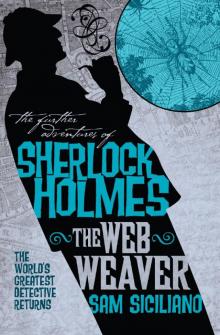 The Web Weaver
The Web Weaver The Further Adventures of Sherlock Holmes--The Devil and the Four
The Further Adventures of Sherlock Holmes--The Devil and the Four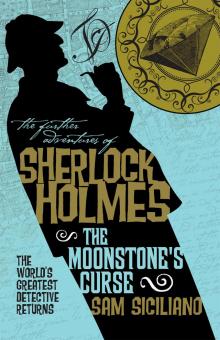 The Moonstone's Curse
The Moonstone's Curse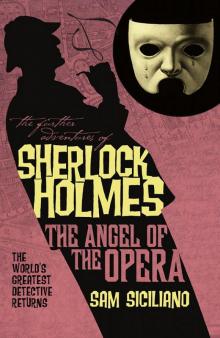 The Angel of the Opera
The Angel of the Opera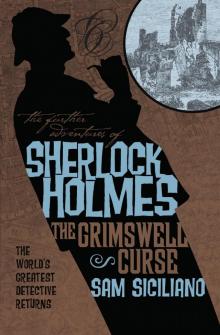 The Grimswell Curse
The Grimswell Curse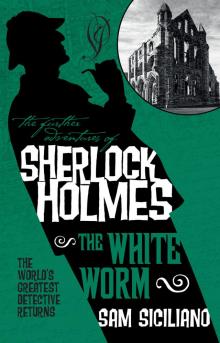 The White Worm
The White Worm